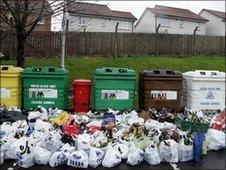Zero waste society plans for Scotland unveiled
- Published

The Scottish government wants a "zero waste" society by 2025
The Scottish government has unveiled a multi-billion pound plan to create a "zero waste" society by the year 2025.
Environment Secretary Richard Lochhead said it was time to tackle nearly 20m tonnes of waste currently produced by Scotland every year.
The zero waste plan includes tough new recycling and landfill targets over the next 15 years.
But some environmentalists say it could lead to the construction of a wave of new incinerators across Scotland.
New measures will include landfill bans for specific types of waste and separate collections of some waste to boost re-use and recycling opportunities.
A new 70% target has been set for all waste to be recycled by 2025 and a maximum 5% target for all waste to be sent to landfill by the same year.
Speaking at the official launch in Edinburgh, Mr Lochhead said the zero waste plan would also help deliver progressive landfill bans. It is hoped that no waste with re-use or recycling potential will be placed in landfill by 2020.
He also argued that the plan could deliver major benefits to the economy as well as the environment.
"Scotland is embarking on the zero waste journey to protect our environment and help our economy. We can't go on as business as usual because we can't afford to and because resources are finite," he said.
"In recent years, the people of Scotland have made substantial progress in cutting waste but households, businesses and wider society still produce enough waste to fill an Olympic-size swimming pool every 10 minutes."
The plan drew a mixed response from environmentalists and analysts.
Environmental impact
Mark O'Dowd, a solicitor with international law firm, HBJ Gateley Wareing, said that in order to meet Scottish government and European Union objectives, 拢6.5bn would have to be spent up to 2025 to deliver a zero waste target.
"What is required is clear investment on next generation infrastructure, in the likes of energy from waste plants, recycling plants and an overhaul of rubbish collections, as well as improving grid connections," he said.
He said the planning system would need to be streamlined and failure to achieve the statutory targets would have a damaging environmental impact and would hit the taxpayer hard through EU fines.
Scottish local authorities welcomed the publication of the plan.
But some environmentalists said they were concerned at the prospect of more incinerators being built.
Green MSP Robin Harper told 91热爆 Scotland he believed a zero waste strategy could be achieved but he remained worried that a 25% cap on incineration of waste could "turn into a target".
He added: "For every tonne of waste we could make about 拢600 in recycled products if we could get all the system working. If we burn it, we are only going to get 拢20 worth of electricity out of it."